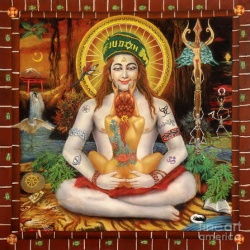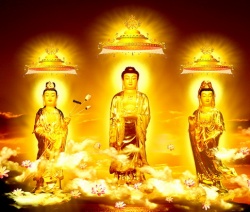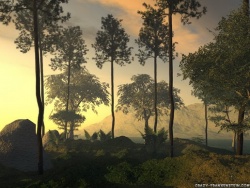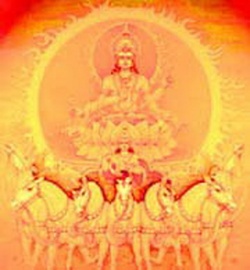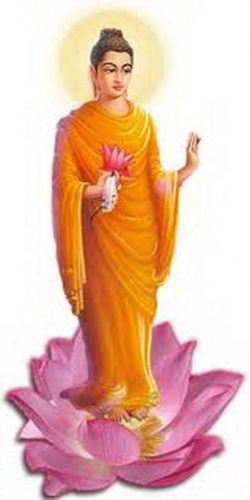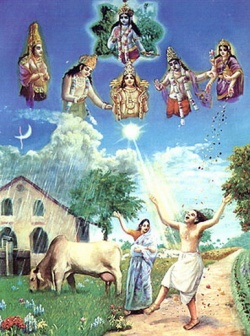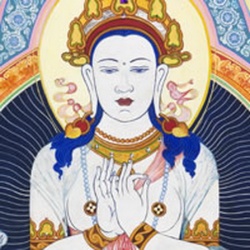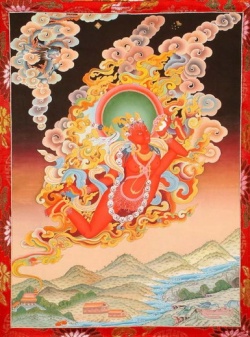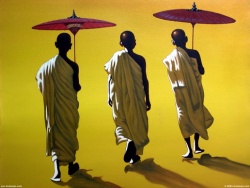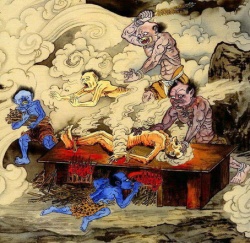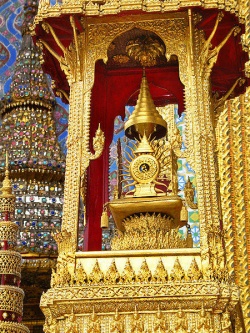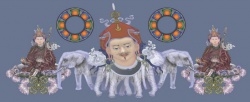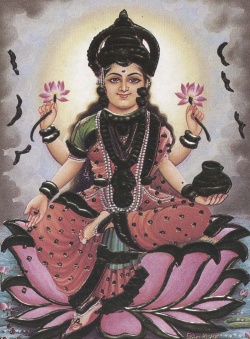The Gospel of Buddha:Chapter 08: King Bimbisara
Siddhattha had cut his waving hair
and had exchanged his royal robe for a mean dress of the colour of the ground.
Having sent home Channa, the charioteer,
together with the noble steed Kanthaka,
to king Suddhodana to bear him the message that the prince had left the world,
the Bodhisatta walked along on the highroad with a begger's bowl in his hand. [1]
Yet the majesty of his mind was ill-concealed under the poverty of his appearance.
His erect gait betrayed his royal birth and his eyes beamed with a fervid zeal for truth.
The beauty of his youth was transfigured by holiness and surrounded his head like a halo. [2]
All the people who saw this unusual sight gazed at him in wonder.
Those who were in haste arrested their steps and looked back;
and there was no one who did not pay him homage. [3]
Having entered the city of Rajagaha,
the prince went from house to house silently waiting till the people offered him food.
Wherever the Blessed One came, the people gave him what they had;
they bowed before him in humility and were filled with gratitude
because he condescended to approach their homes. [4]
Old and young people were moved and said:
"This is a noble muni!
His approach is bliss.
What a great joy for us!" [5]
And king Bimbisara, noticing the commotion in the city,
inquired the cause of it,
and when he learned the news sent one of his attendants to observe the stranger. [6]
Having heard that the muni must be a Sakya and of noble family,
and that he had retired to the bank of a flowing river
in the woods to eat the food in his bowl,
the king was moved in his heart;
he donned his royal robe,
placed his golden crown upon his head
and went out in the company of aged and wise counsellors
to meet his mysterious guest. [7]
The king found the muni of the Sakya race seated under a tree.
Contemplating the composure of his face
and the gentleness of his deportment,
Bimbisara greeted him reverently and said: [8]
"O samana, thy hands are fit to grasp the reins of an empire
and should not hold a beggar's bowl.
I am sorry to see thee wasting thy youth.
Believing that thou art of royal descent,
I invite thee to join me in the government of my country
and share my royal power.
Desire for power is becoming to the noble-minded,
and wealth should not be despised.
To grow rich and lose religion is not true gain.
But he who possesses all three,
power, wealth and religion,
enjoying them in discretion and with wisdom,
him I call a great master." [9]
The great Sakyamuni lifted his eyes and replied: [10]
"Thou art known, O king, to be liberal and religious,
and thy words are prudent.
A kind man who makes good use of wealth
is rightly said to possess a great treasure,
but the miser who hoards up his riches will have no profit. [11]
"Charity is rich in returns;
charity is the greatest wealth,
for though it scatters,
it brings no repentance. [12]
"I have severed all ties because I seek deliverance.
How is it possible for me to return to the world?
He who seeks religious truth, which is the highest treasure of all,
must leave behind all that can concern him or draw away his attention,
and must be bent upon that one goal alone.
He must free his soul from covetousness and lust,
and also from the desire for power. [13]
"Indulge in lust but a little,
and lust like a child will grow.
Wield worldly power
and you will be burdened with cares. [14]
"Better than sovereignty over the earth,
better than living in heaven,
better than lordship over all the worlds,
is the fruit of holiness. [15]
"The Bodhisatta has recognized the illusory nature of wealth
and will not take poison as food. [16]
"Will a fish that has been baited still covet the hook,
or an escaped bird love the net? [17]
"Would a rabbit rescued from the serpent's mouth go back to be devoured?
Would a man who has burnt his hand with a torch take up the torch
after he had dropped it to the earth?
Would a blind man who has recovered his sight desire to spoil his eyes again? [18]
"The sick man suffering from fever seeks for a cooling medicine.
Shall we advise him to drink that which will increase the fever?
Shall we quench a fire by heaping fuel upon it? [19]
"I pray thee, pity me not.
Rather pity those who are burdened with the cares of royalty
and the worry of great riches.
They enjoy them in fear and trembling,
for they are constantly threatened with a loss of those boons
on whose possession their hearts are set,
and when they die they cannot take along
either their gold or the kingly diadem. [20]
"My heart hankers no vulgar profit,
so I have put away my royal inheritance
and prefer to be free from the burdens of life. [21]
"Therefore, try not to entangle me in new relationships and duties,
nor hinder me from completing the work I have begun. [22]
"I regret to leave thee.
But I will go to the sages who can teach me religion
and so find the path on which we can escape evil. [23]
"May thy country enjoy peace and prosperity,
and may wisdom be shed upon thy rule
like the brightness of the noon day sun.
May thy royal power be strong
and may righteousness be the sceptre in thine hand." [24]
The king, clasping his hands with reverence,
bowed down before Sakyamuni and said:
"Mayest thou obtain that which thou seekest,
and when thou hast obtained it, come back, I pray thee,
and receive me as thy disciple." [25]
The Bodhisatta parted from the king in friendship and goodwill,
and purposed in his heart to grant his request. [26]
Continue Reading
- The Gospel of Buddha: Preface
- The Gospel of Buddha:Chapter 01: Rejoice
- The Gospel of Buddha:Chapter 02: Samsara and Nirvana
- The Gospel of Buddha:Chapter 03: Truth the Saviour
- The Gospel of Buddha:Chapter 04: The Bodhisatta's Birth
- The Gospel of Buddha:Chapter 05: The Ties of Life
- The Gospel of Buddha:Chapter 06: The Three Woes
- The Gospel of Buddha:Chapter 07: The Bodhisatta's Renunciation
- The Gospel of Buddha:Chapter 08: King Bimbisara
- The Gospel of Buddha:Chapter 09: The Bodhisatta's Search
- The Gospel of Buddha:Chapter 10: Uruvela, the Place of Mortification
- The Gospel of Buddha:Chapter 11: Mara, the Evil One
- The Gospel of Buddha:Chapter 12: Enlightenment
- The Gospel of Buddha:Chapter 13: The First Converts
- The Gospel of Buddha:Chapter 14: Brahma's Request
- The Gospel of Buddha:Chapter 15: Upaka
- The Gospel of Buddha:Chapter 16: The Sermon at Benares
- The Gospel of Buddha:Chapter 17: The Sangha
- The Gospel of Buddha:Chapter 18: Yasa, the Youth of Benares
- The Gospel of Buddha:Chapter 19: Kassapa
- The Gospel of Buddha:Chapter 20: The Sermon at Rajagaha
- The Gospel of Buddha:Chapter 21: The King's Gift
- The Gospel of Buddha:Chapter 22: Sariputta and Moggallana
- The Gospel of Buddha:Chapter 23: Anathapindika
- The Gospel of Buddha:Chapter 24: The Sermon on Charity
- The Gospel of Buddha:Chapter 25: Jetavana
- The Gospel of Buddha:Chapter 26: The Three Characteristics and the Uncreate
- The Gospel of Buddha:Chapter 27: The Buddha's Father
- The Gospel of Buddha:Chapter 28: Yasodhara
- The Gospel of Buddha:Chapter 29: Rahula
- The Gospel of Buddha:Chapter 30: Jivaka, the Physician
- The Gospel of Buddha:Chapter 31: The Buddha's Parents Attain Nirvana
- The Gospel of Buddha:Chapter 32: Women Admitted to the Sangha
- The Gospel of Buddha:Chapter 33: The Bhikkhus' Conduct Toward Women
- The Gospel of Buddha:Chapter 34: Visakha
- The Gospel of Buddha:Chapter 35: The Uposatha and Patimokkha
- The Gospel of Buddha:Chapter 36: The Schism
- The Gospel of Buddha:Chapter 37: The Re-establishment of Concord
- The Gospel of Buddha:Chapter 38: The Bhikkhus Rebuked
- The Gospel of Buddha:Chapter 39: Devadatta
- The Gospel of Buddha:Chapter 40: Name and Form
- The Gospel of Buddha:Chapter 41: The Goal
- The Gospel of Buddha:Chapter 42: Miracles Forbidden
- The Gospel of Buddha:Chapter 43: The Vanity of Worldliness
- The Gospel of Buddha:Chapter 44: Secrecy and Publicity
- The Gospel of Buddha:Chapter 45: The Annihilation of Suffering
- The Gospel of Buddha:Chapter 46: Avoiding the Ten Evils
- The Gospel of Buddha:Chapter 47: The Preacher's Mission
- The Gospel of Buddha:Chapter 48: The Dhammapada
- The Gospel of Buddha:Chapter 49: The Two Brahmans
- The Gospel of Buddha:Chapter 50: Guard the Six Quarters
- The Gospel of Buddha:Chapter 51: Simha's Question Concerning Annihilation
- The Gospel of Buddha:Chapter 52: All Existence is Spiritual
- The Gospel of Buddha:Chapter 53: Identity and Non-Identity
- The Gospel of Buddha:Chapter 54: The Buddha Omnipresent
- The Gospel of Buddha:Chapter 55: One Essence, One Law, One Aim
- The Gospel of Buddha:Chapter 56: The Lesson Given to Rahula
- The Gospel of Buddha:Chapter 57: The Sermon on Abuse
- The Gospel of Buddha:Chapter 58: The Buddha Replies to the Deva
- The Gospel of Buddha:Chapter 59: Words of Instruction
- The Gospel of Buddha:Chapter 60: Amitabha
- The Gospel of Buddha:Chapter 61: The Teacher Unknown
- The Gospel of Buddha:Chapter 62: Parables
- The Gospel of Buddha:Chapter 63: The Widow's Two Mites and the Parable of the Three Merchants
- The Gospel of Buddha:Chapter 64: The Man Born Blind
- The Gospel of Buddha:Chapter 65: The Lost Son
- The Gospel of Buddha:Chapter 66: The Giddy Fish
- The Gospel of Buddha:Chapter 67: The Cruel Crane Outwitted
- The Gospel of Buddha:Chapter 68: Four Kinds of Merit
- The Gospel of Buddha:Chapter 69: The Light of the World
- The Gospel of Buddha:Chapter 70: Luxurious Living
- The Gospel of Buddha:Chapter 71: The Communication of Bliss
- The Gospel of Buddha:Chapter 72: The Listless Fool
- The Gospel of Buddha:Chapter 73: Rescue in the Desert
- The Gospel of Buddha:Chapter 74: The Sower
- The Gospel of Buddha:Chapter 75: The Outcast
- The Gospel of Buddha:Chapter 76: The Woman at the Well
- The Gospel of Buddha:Chapter 77: The Peacemaker
- The Gospel of Buddha:Chapter 78: The Hungry Dog
- The Gospel of Buddha:Chapter 79: The Despot
- The Gospel of Buddha:Chapter 80: Vasavadatta
- The Gospel of Buddha:Chapter 81: The Marriage-Feast in Jambunada
- The Gospel of Buddha:Chapter 82: A Party in Search of a Thief
- The Gospel of Buddha:Chapter 83: In the Realm of Yamaraja
- The Gospel of Buddha:Chapter 84: The Mustard Seed
- The Gospel of Buddha:Chapter 85: Following the Master Over the Stream
- The Gospel of Buddha:Chapter 86: The Sick Bhikkhu
- The Gospel of Buddha:Chapter 87: The Patient Elephant
- The Gospel of Buddha:Chapter 88: The Conditions of Welfare
- The Gospel of Buddha:Chapter 89: Sariputta's Faith
- The Gospel of Buddha:Chapter 90: Pataliputta
- The Gospel of Buddha:Chapter 91: The Mirror of Truth
- The Gospel of Buddha:Chapter 92: Ambapali
- The Gospel of Buddha:Chapter 93: The Buddha's Farewell Address
- The Gospel of Buddha:Chapter 94: The Buddha Announces His Death
- The Gospel of Buddha:Chapter 95: Chunda, the Smith
- The Gospel of Buddha:Chapter 96: Metteyya
- The Gospel of Buddha:Chapter 97: The Buddha's Final Entering into Nirvana
- The Gospel of Buddha:Chapter 98: The Three Personalities of the Buddha
- The Gospel of Buddha:Chapter 99: The Purpose of Being
- The Gospel of Buddha:Chapter 100: The Praise of All the Buddhas
